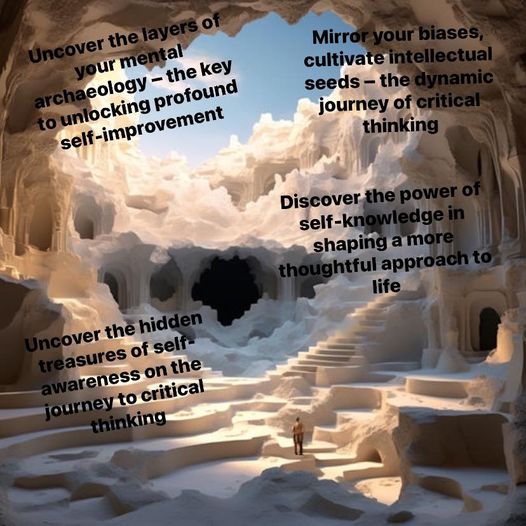
Self-knowledge is the beginning of self-improvement. It can be likened to embarking on a journey through the intricate landscapes of one’s own mind and emotions. Imagine the mind as a vast, uncharted territory, filled with valleys of hidden fears, peaks of untapped potential, and rivers of past experiences winding through the subconscious.
In this metaphorical journey, self-knowledge acts as the compass, helping navigate the twists and turns of the mental terrain. Just as a seasoned explorer gains insights into the characteristics of a new land, understanding oneself provides a foundation for growth. The journey starts by peeling back layers, like uncovering the layers of an ancient archaeological site, revealing buried beliefs, habits, and emotions that shape one’s identity.
As the explorer delves deeper, they encounter the cliffs of self-limiting beliefs and the forests of unexplored talents. Self-awareness becomes the lantern that illuminates these hidden corners, exposing the obstacles that hinder personal development. It is at this point that the true work of self-improvement begins, as the individual must decide whether to construct bridges over the chasms of self-doubt or blaze trails through the thickets of complacency.
The process of self-improvement can be likened to cultivating a garden. Armed with the knowledge of their inner landscape, individuals can identify the weeds of negative thought patterns and uproot them. They can nurture the seeds of positive habits and skills, cultivating a vibrant and flourishing internal garden. The understanding gained from self-knowledge acts as both the sunlight that fuels growth and the pruning shears that shape a more refined and resilient self.
In this metaphorical exploration, the journey towards self-improvement is not a linear path but a continuous process of discovery and refinement. Just as a skilled artist continually hones their craft or a dedicated gardener tends to their plants, individuals committed to self-improvement engage in an ongoing cycle of self-reflection, learning, and adaptation.
Ultimately, the metaphorical journey of self-improvement starts with the recognition that the map to personal growth is found within. Self-knowledge serves as the compass, guiding individuals through the diverse landscapes of their own minds, paving the way for meaningful self-improvement and transformation.
Let’s explore why self-knowledge is crucial for the cultivation of critical thinking skills:
1- Navigating Cognitive Terrain: Critical thinking encompasses the capacity to examine, assess, and integrate information derived from observations and experiences. Like navigating a vast cognitive terrain, individuals need self-awareness to recognize their cognitive biases, assumptions, and preconceptions. Understanding one’s own mental landscape allows for a more objective exploration of ideas, fostering a deeper and more nuanced critical perspective.
2- Mirror of Personal Biases: Self-knowledge acts as a mirror reflecting personal biases and beliefs. Critical thinking requires an awareness of these biases to avoid falling into the trap of subjective reasoning. By acknowledging and understanding one’s own predispositions, individuals can approach information with a more discerning and objective mindset.
3-Archaeology of Thought Processes: Just as an archaeologist digs into the layers of history, understanding one’s thought processes involves delving into the layers of personal experiences and mental constructs. Self-knowledge allows individuals to excavate their own cognitive patterns, facilitating a clearer understanding of how they approach problem-solving, make decisions, and interpret information critically.
4-Seed of Intellectual Growth: Critical thinking is not a static skill but a dynamic process of intellectual and spiritual growth. Self-knowledge serves as the seed from which critical thinking skills can sprout and flourish. By recognizing their intellectual strengths and weaknesses, individuals can intentionally cultivate areas that require improvement, fostering continuous development in their ability to think critically.
5-Inner Symphony of Reasoning:
The orchestration of critical thinking involves harmonizing various cognitive instruments—logic, analysis, creativity. Self-knowledge is the conductor ensuring that these instruments work in tandem. Understanding one’s cognitive strengths allows individuals to leverage them, while recognizing weaknesses prompts the development of strategies to compensate, creating a more balanced and effective symphony of reasoning.
In the grand tapestry of human evolution, the significance of self-knowledge for critical thinking becomes even more pronounced when considering the historical context. Throughout history, our ancestors, lacking the refined critical thinking skills we strive for today, faced challenges in recognizing and accepting profound ideas. The absence of robust critical thinking might have led them to reject even prophets and messengers, emphasizing the vital role self-awareness plays in shaping perspectives and fostering a more open-minded approach to transformative concepts. In acknowledging this historical perspective, we underscore the enduring importance of self-knowledge in navigating the complexities of thought and belief systems.
In essence, for the development of critical thinking, self-knowledge is indispensable. It acts as the foundation, the mirror, the archaeologist’s toolkit, the seed, and the conductor’s baton, providing the necessary insights and awareness to navigate the complex intellectual landscape. Embracing self-knowledge enhances critical thinking, contributing to a thoughtful approach to problem-solving, decision-making, and engaging with diverse perspectives.

